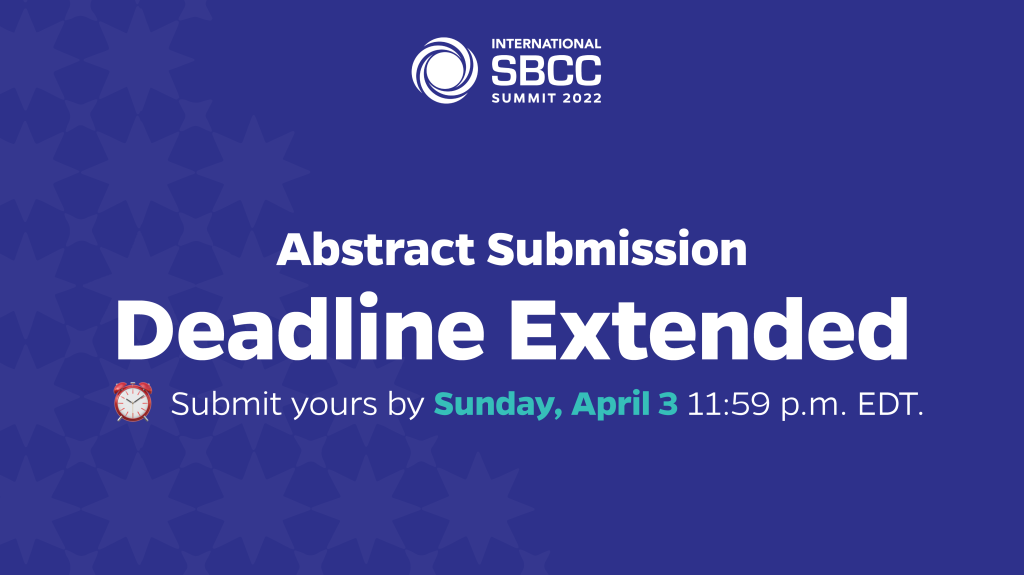Hurry Up! Don’t Miss The Abstract Submission Deadline – Submit Now!
Understanding the Abstract Submission Deadline: Everything You Need to Know
Welcome, Smart Readers!
Greetings, Smart Readers! In this article, we will discuss the important topic of abstract submission deadlines. Whether you are an academic researcher, a conference organizer, or simply someone interested in the world of abstract submissions, understanding the significance of submission deadlines is crucial. This article aims to provide you with a comprehensive guide on abstract submission deadlines, covering what they are, who they are for, when and where they occur, why they are important, and how to navigate them effectively.
Table: Abstract Submission Deadline Information
Topic
Description
What is an abstract submission deadline?
An explanation of the concept of abstract submission deadlines and their purpose.
2 Picture Gallery: Hurry Up! Don’t Miss The Abstract Submission Deadline – Submit Now!


Who needs to adhere to abstract submission deadlines?
Identification of the individuals and groups who are required to meet abstract submission deadlines.

Image Source: mozfiles.com
When and where do abstract submission deadlines occur?
An overview of the timing and locations of abstract submission deadlines.
Why are abstract submission deadlines important?
An exploration of the significance and benefits of adhering to abstract submission deadlines.
How to effectively manage abstract submission deadlines?
Tips and strategies for successfully navigating and meeting abstract submission deadlines.
Advantages and disadvantages of abstract submission deadlines
A detailed discussion on the benefits and drawbacks associated with adhering to abstract submission deadlines.

Image Source: sbccsummit.org
FAQ: Frequently Asked Questions about abstract submission deadlines
Answers to common queries related to abstract submission deadlines.
Conclusion
A summary of the key points discussed and a call to action for readers to effectively manage abstract submission deadlines.
Final Remarks
A disclaimer and closing thoughts on the importance of understanding abstract submission deadlines.
What is an abstract submission deadline? 📅
An abstract submission deadline refers to the specified date by which individuals or groups must submit their abstracts for consideration in a conference, journal, or other academic or professional setting. The deadline is set to allow organizers sufficient time to review and select the submissions that will be included in the event or publication.
The abstract itself is a concise summary of a research paper, presentation, or project, highlighting the main objectives, methodology, results, and conclusions. Abstracts are typically required to be a certain length, often ranging from 150 to 500 words, depending on the specific guidelines provided by the organizers.
Meeting the abstract submission deadline is crucial as it ensures that your work is considered for inclusion in the desired event or publication. It allows organizers to plan the schedule, allocate resources, and inform participants about the accepted presentations or papers.
Who needs to adhere to abstract submission deadlines? 👥
Abstract submission deadlines apply to various individuals and groups, including researchers, academics, students, and professionals from different fields. Whether you are a seasoned scientist, a graduate student, or a professional seeking to share your expertise, adhering to the submission deadline is essential.
Conference organizers also play a crucial role in setting and managing abstract submission deadlines. They are responsible for defining the submission guidelines, establishing the deadline, and overseeing the review process to ensure a fair and efficient selection of abstracts.
When and where do abstract submission deadlines occur? ⌛🌍
Abstract submission deadlines occur at different times and locations depending on the specific event or publication. Conferences, symposiums, and workshops usually have predetermined deadlines set several months in advance to allow participants ample time to prepare their abstracts and travel arrangements if necessary.
Journal publications may have specific submission windows throughout the year or operate on a rolling basis, meaning submissions are accepted and reviewed continuously. It is important to consult the respective conference or journal’s website, call for papers, or guidelines to determine the specific abstract submission deadline.
Why are abstract submission deadlines important? 🤔
Abstract submission deadlines are important for several reasons:
Organizational Efficiency: By adhering to submission deadlines, organizers can effectively plan the conference schedule, allocate presentation slots, and communicate acceptance or rejection notifications to the participants in a timely manner.
Promotion and Visibility: Meeting the submission deadline increases the chances of your work being included in the event or publication, providing valuable exposure and networking opportunities within your field.
Collaboration Opportunities: Abstract submission deadlines serve as a catalyst for researchers and professionals to connect, collaborate, and share their knowledge and findings with like-minded individuals.
Quality Control: Setting a submission deadline allows organizers to manage the number of abstracts received, ensuring that the selection process is thorough, fair, and reflective of the event or publication’s objectives.
Time Management: Adhering to the abstract submission deadline enables participants to effectively manage their time, allocate resources, and make necessary revisions or improvements to their abstracts.
Overall, abstract submission deadlines are essential for the smooth operation of conferences, journals, and other professional platforms, facilitating the exchange of knowledge, fostering collaboration, and ensuring high-quality contributions.
How to effectively manage abstract submission deadlines? ✅
To effectively manage abstract submission deadlines, consider the following tips:
Start Early: Begin working on your abstract well in advance to allow ample time for research, writing, and revisions.
Read the Guidelines: Familiarize yourself with the submission guidelines, including the word count, formatting requirements, and any specific instructions provided by the organizers.
Outline Your Abstract: Create a clear outline of your abstract, organizing the main objectives, methodology, results, and conclusions in a logical manner.
Proofread and Edit: Take the time to carefully proofread your abstract for grammatical errors, clarity, and coherence. Consider seeking feedback from colleagues or mentors.
Submit Ahead of Time: Aim to submit your abstract a few days before the actual deadline to avoid any last-minute technical issues or unforeseen circumstances.
Follow-Up: After submission, keep track of any notifications or updates from the organizers. If you receive acceptance, promptly follow the provided instructions for further steps.
Learn from Rejections: If your abstract is not accepted, use the feedback provided by the reviewers to improve your work and consider submitting it to other relevant conferences or journals. Persistence is key!
By following these tips, you can enhance your chances of meeting abstract submission deadlines and increase the likelihood of having your work accepted and showcased in your desired academic or professional setting.
Advantages and Disadvantages of Abstract Submission Deadlines 📚
As with any aspect of academic or professional life, abstract submission deadlines come with their own set of advantages and disadvantages. Let’s explore both sides:
Advantages of Abstract Submission Deadlines:
Promotes Organization: Abstract submission deadlines encourage individuals and groups to stay organized, plan their work effectively, and meet the required deadlines.
Ensures Quality: By setting a submission deadline, organizers can review the abstracts thoroughly and select high-quality contributions that align with the event or publication objectives.
Facilitates Planning: Submission deadlines allow organizers to plan the logistics, schedule presentations, and allocate resources efficiently, ensuring a well-structured and successful event or publication.
Encourages Collaboration: Abstract submission deadlines bring together researchers and professionals from various fields, fostering collaboration, knowledge sharing, and potential partnerships.
Provides Networking Opportunities: Participating in conferences or publications with strict submission deadlines offers valuable networking opportunities, allowing individuals to connect with experts and peers in their respective fields.
Disadvantages of Abstract Submission Deadlines:
Time Constraints: Strict submission deadlines may create pressure and time constraints for individuals, potentially compromising the quality of their work.
Missed Opportunities: If individuals fail to meet the abstract submission deadline, they may miss the chance to showcase their work, receive feedback, or participate in important events or publications.
Limitations on Flexibility: Submission deadlines can restrict individuals in terms of the timing and location of events or publications, making it challenging for those with conflicting commitments or limited resources to participate.
Increased Competition: Strict submission deadlines often lead to a higher number of submissions, resulting in increased competition for acceptance, particularly in prestigious conferences or journals.
Potential Stress: The pressure to meet abstract submission deadlines can create stress for individuals, especially if they are simultaneously managing other academic or professional responsibilities.
It is important to weigh these advantages and disadvantages, considering your specific circumstances and priorities when approaching abstract submission deadlines.
FAQ: Frequently Asked Questions about Abstract Submission Deadlines ❓
1. Can I submit my abstract after the submission deadline?
No, abstracts submitted after the deadline are typically not considered for inclusion in the event or publication. It is important to adhere to the specified deadlines to ensure your work is evaluated.
2. What should I do if I miss the abstract submission deadline?
If you miss the deadline, reach out to the organizers and inquire if any exceptions can be made. However, it is important to note that organizers generally adhere to deadlines to maintain fairness and efficiency.
3. Can I modify my abstract after submission?
It depends on the specific guidelines provided by the organizers. Some conferences or journals allow minor edits or revisions within a specified timeframe, while others do not permit any modifications once the submission is made. Consult the guidelines or contact the organizers for clarification.
4. How can I find abstract submission deadlines for conferences or journals?
You can find abstract submission deadlines on the official websites of conferences or journals. Look for the Call for Papers section, guidelines, or announcements related to abstract submissions. You can also subscribe to relevant mailing lists or academic platforms to stay updated.
5. Can I submit the same abstract to multiple conferences or journals?
It depends on the policies of each conference or journal. Some allow simultaneous submissions, while others require exclusive submissions. It is important to carefully review the guidelines and ensure compliance with the rules of each event or publication.
Conclusion 📝
In conclusion, understanding abstract submission deadlines is essential for researchers, academics, and professionals in various fields. By adhering to these deadlines, individuals can increase their chances of having their work accepted, gain exposure, and foster collaboration within their communities. Effective management of abstract submission deadlines involves starting early, following the guidelines, and staying organized throughout the process. While abstract submission deadlines come with advantages and disadvantages, they play a vital role in maintaining the efficiency and quality of conferences, journals, and other professional platforms.
Final Remarks ✨
As we wrap up this article, it is important to note that abstract submission deadlines are subject to variations depending on the specific event or publication. Always refer to the official guidelines, websites, or announcements provided by the organizers for the most accurate and up-to-date information. We hope this article has provided you with valuable insights and guidance for effectively managing abstract submission deadlines. Remember, meeting these deadlines is not only crucial for the success of your work but also for the advancement of your field and the broader academic and professional communities. Good luck with your future abstract submissions!
This post topic: Abstract



